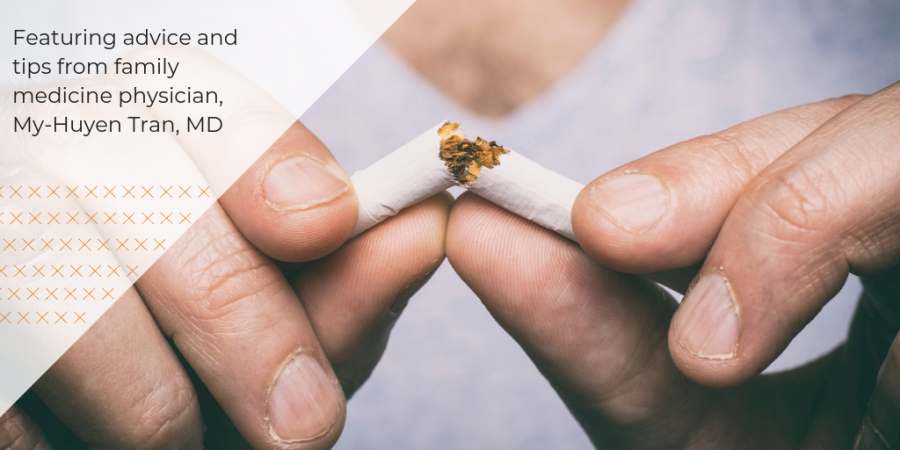If you smoke, you hear certain things on repeat: how you need to quit, how expensive the habit is and how bad it is for your health. All of these things are true, but it’s also true that quitting can be exceptionally hard and may take several attempts. Thirty-eight million adults smoke in the United States, and rural areas in East Texas have the highest numbers of smokers in the state. If you are considering quitting or have just quit, it’s important to have a realistic plan to keep you on track.
Here are some tips to help you succeed in kicking the habit:
Make a Plan
Once you make the decision to quit, you need to take steps to improve your environment, both physical and mental. Pick your time to quit carefully, and avoid making such a big change during highly emotional times, like holidays or breakups. Also, give yourself a clean slate by cleaning your house, car, and workspace. “Once patients feel that they are ready to quit, I recommend the first thing to do is to start ‘fresh’ so that their environment is set to help make their efforts successful,” says Dr. My-Huyen Tran, physician at UT Health East Texas. You can do this by washing sheets, doing the laundry and throwing away ashtrays to remove the lingering smell of smoke. Dr. Tran also recommends avoiding alcohol, as drinking will make it harder to stay committed. She also suggests a food cleanse: “Stock the fridge/freezer with healthy fruits and vegetables.”
First Steps
Almost immediately after you put out your last cigarette, your body will start to labor toward recovery. “Even within the first few minutes of not smoking, the body will make its progression to heal—blood pressure can start to normalize, and there is improvement of overall blood flow,” says Dr. Tran. From there, your lung function will improve, your chances of lung disease and cancer will decrease and you will stop smelling like smoke. These long-term benefits are great reasons to quit, but are especially important to remember when the short-term side effects kick in.
“The first week will be difficult,” says Dr. Tran. “Some symptoms of nicotine withdrawal could include increased irritability, depression, anxiety, cravings, headaches, insomnia, and cough.” To combat these symptoms, you should first see your physician. They are there to provide tips, support and pharmacological treatment, if needed. After talking with your physician, avoid situations that give you the urge to smoke.
Forming New Habits
When you quit smoking, not only will you crave the nicotine, but you’ll also crave the habit of smoking, like holding a cigarette or walking outside. Combat this by forming replacement habits to fill the void when you have the next impulse to smoke. Chewing gum is an option among others Dr. Tran has seen over the years. “I suggest to my patients cutting up straws so that it would be a similar size to a cigarette and puff on that to appease the social habit of wanting to hold on to a cigarette,” says Dr. Tran. “Similarly, I also suggest the use of flavored toothpicks for the same effect.”
Try filling the time you used to smoke with a healthy habit. If you smoked after dinner, try instead to take a walk around the neighborhood. If you used smoking to relieve stress, find an activity like yoga, listening to music, reading a chapter in a book or deep breathing to help relax.
Celebrate Your Successes
There is no doubt about it—quitting is hard. “Studies have shown that it may take 6–7 times for an individual to try quitting before they can actually be successful,” says Dr. Tran. That’s why you should feel proud when you reach your goals and find ways to celebrate. Reward yourself with a movie night or a new video game. After all, you’re now saving all that money you used to spend on packs of cigarettes.
Take opportunities to remind yourself why you quit. Write them down and read them whenever you get a craving. Be proud about how much your health has improved, and check in with your physician about your progress.
You can absolutely quit. It may feel overwhelming and you might be filled with doubt, but there are people to help and support you. “We have clinicians, psychology counselors, and multiple resources available to help,” says Dr. Tran. See your physician, come up with a plan and get healthier!
To find a physician and schedule an appointment, please call 903-877-7200.

My-Huyen Mary Tran, MD, is a board-certified family medicine physician who sees patients at UT Health East Texas Physicians North Campus Tyler. “My goal is to work with my patients to help them achieve optimal health through patient education, promoting healthy lifestyle and disease prevention.”
Dr. Tran is specifically interested in chronic medical management, obesity medicine, menopause, academic medicine, health literacy and promoting smoking cessation. “We can work together to improve your overall health. Focus on the small accomplishments to achieve your long-term health goals.”

